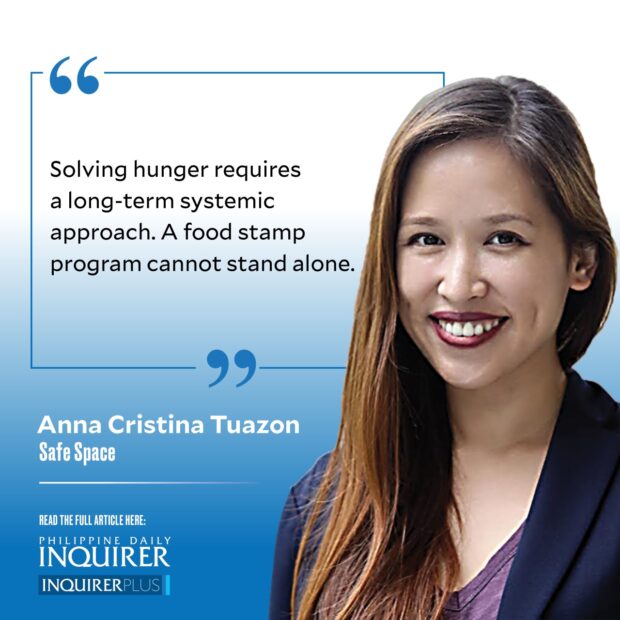Making food stamps better

The Department of Social Welfare and Development (DSWD) is set to launch its pilot run of a food stamp program in July. It will provide electronic benefit transfers of food credits worth P3,000 to 3,000 families in selected sites. These food credits can be applied to a select list of food commodities from DSWD-accredited local retailers. Eventually, DSWD Secretary Rex Gatchalian said, the Walang Gutom 2027 food stamp program aims to help one million poor households in the country. A recent Social Weather Stations survey found that almost three million Filipinos experienced being hungry and not having anything to eat in the first three months of the year.
I hope that DSWD takes great care in designing this program carefully, especially in how it plans to evaluate the success of its pilot run. What would be considered a successful outcome? Would it be mere successful distribution of food stamps? I hope that they would consider impact outcomes such as nutrition, health, and quality of life. Such outcomes, of course, require a longer time for evaluation—and I dare say it’s worth it.
We only need to look at the folly of the country’s K-12 beginnings. They failed to study impact outcomes such as improved learning and job readiness in its pilot stage and rushed nationwide implementation. Now we are dealing with potentially having to scrap the program because it failed to show results.
Solving hunger requires a long-term, systemic approach. A food stamp program cannot stand alone. The moment funding runs out, the gains will stop. Food stamps must be integrated into a larger, multilayered solution. For example, P3,000 for the average Filipino family’s food budget is not enough. We recently bought groceries comprising mostly vegetables and very little meat at the public market, which cost us more than P1,400. And that was just for a household of two that would last us a week. If we shopped at a supermarket, it would easily be more than P4,000.
An important way to maximize the funds of the food stamps program is to make sure that food prices are affordable. With the President at the helm of the Department of Agriculture, there is no reason why there can’t be a push to increase food production. This means protecting and retaining agricultural lands instead of converting them to subdivisions. This means supporting farmers (who in a tragic irony will need food stamps considering their current income). We need to make farming an attractive and viable career to increase our food production and thereby lower consumer costs. This will make P3,000 go much further in alleviating hunger and improving health and nutrition.
DSWD Secretary Gatchalian noted that they will set up a condition where beneficiaries will have to provide certification from the Public Employment Service Office that they are being counted as part of the work force. This reminds me of the time I was training at a county welfare office in the United States. My role was to provide counseling to welfare recipients whose psychological disabilities hinder them from gaining and maintaining employment. The counseling hours spent with me were credited toward “job seeking hours,” which was the US’ condition to receive welfare benefits. Aside from my services, the welfare office holds daily classes in writing a resume, computer literacy, and job interview preps. They also have phone and computer rooms for public use so that people can contact potential job sites without cost.
I hope that the DSWD considers this instead of certificate of employment. Especially since the secretary’s logic was that solving hunger would increase capacity to work — so we expect employment as an outcome of the program and not its prerequisite. I also hope the DSWD considers the issue of disability and not use this as a barrier to receiving food stamps.
Instead of requiring employment, we can incentivize beneficiaries into taking advantage of job-facilitating resources such as livelihood and Technical Education and Skills Development Authority trainings, job fairs and seminars, and job readiness workshops. We must also ensure that these activities are offered within the barangay vicinity (as well as these DSWD-accredited retailers!) as we know the cost of travel is too prohibitive. If we can guarantee that there will be adequate, cost-free, community-level resources for them to find quality work, then this will be much more helpful in meeting the goal of improving employment and income levels.
Providing food stamps can be a welcome relief — and it will be a short-term one. If we augment this with a commitment to increasing national food production and providing sustainable opportunities for livelihood and income, then food stamps can buy us more than just food. It can buy us a better life.
















